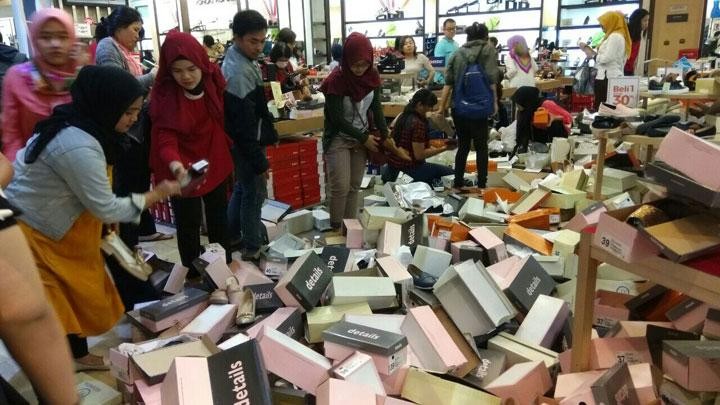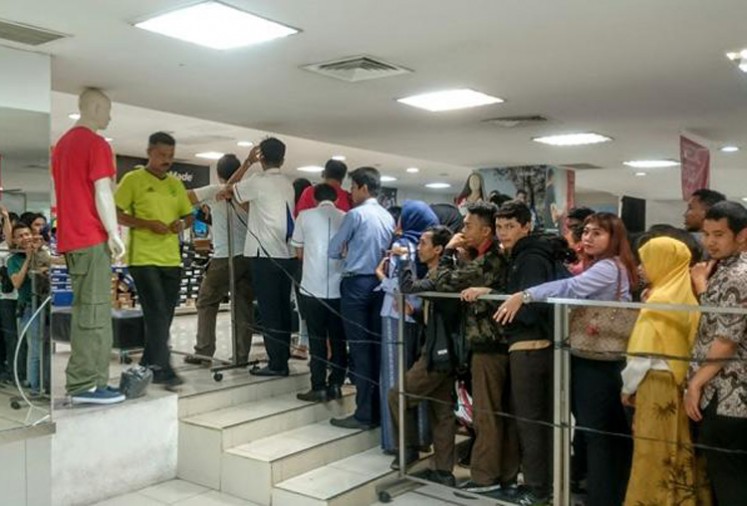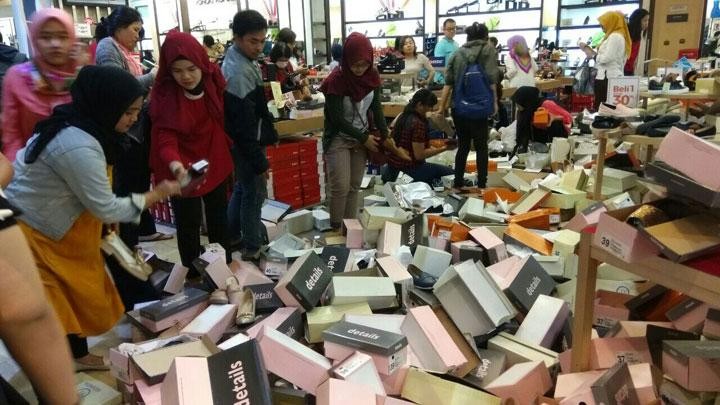Large department stores seem to be starting 2019 under gloomy prospects after closing several of their outlets in the first month of the year.
Analysts see this as an indication that giant retail companies can no longer afford to compete with the growing number of smaller convenience stores.
The spokesperson for Hero Supermarket, Tony Mampuk, announced that the publicly-listed retailer had closed 26 of its stores and would lay off 532 employees from its food business segment as part of efficiency measures triggered by a decline in sales last year.
“The company is currently facing a challenge, particularly in the food business segment,” he said in a release obtained by The Jakarta Post recently. “So, we’ve taken the necessary steps to maintain the sustainability of our business.”
 Shoe boxes litter the floor of Matahari department store in Taman Anggrek shopping mall, West Jakarta, on Nov. 21, 2017 as shoppers overwhelm the store prior its closure on Dec. 3, 2017. (Tempo/Vindry Florentin)
Shoe boxes litter the floor of Matahari department store in Taman Anggrek shopping mall, West Jakarta, on Nov. 21, 2017 as shoppers overwhelm the store prior its closure on Dec. 3, 2017. (Tempo/Vindry Florentin)
As of the third quarter of last year, Hero recorded a 1.13 percent year-on-year (yoy) decrease in revenue to Rp 9.85 trillion (US$698.26 million) due to a slump in its food business, which saw a 6 percent decline in sales during the same period, Tony added.
He said the decline caused operational losses of Rp 163 billion during the January to September period of last year, compared to the loss of Rp 79 billion recorded in the same period in 2017.
However, overall, the company still booked a 22.41 percent increase in profit during the third quarter of last year to Rp 86.18 billion, Tony said, adding that Hero’s non-food business continued to record strong growth.
Some link the slower food sales to a Tetra Pak Index study conducted in 2016, which revealed that 1.2 percent of shoppers in Jakarta shopped for their groceries online. The number is expected to increase to 5.4 percent of consumers in 2030.
However, Center of Reform on Economics (Core) Indonesia research head Mohammad Faisal believed that the trend of online grocery shopping might not hit giant retailers like Giant and Hero too hard because the e-commerce industry only had about a 3 percent market share in the country.
“Instead, Hero’s decision to close 26 stores is an impact of customers’ shifting behavior,” he said, adding that the nationwide mushrooming of mini markets such as Indomaret and Alfamart had encouraged customers to buy fast-moving consumer goods, like toothpaste and food, at smaller stores located close their homes.
 People queue in front a Lotus Department Store outlet in Jakarta on Oct 25 to buy goods with discounted prices after PT Mitra Adiperkasa announced its plans to close three outlets. (tempo.co/ Rully Kesuma )
People queue in front a Lotus Department Store outlet in Jakarta on Oct 25 to buy goods with discounted prices after PT Mitra Adiperkasa announced its plans to close three outlets. (tempo.co/ Rully Kesuma )
Another “victim” of the trend is PT Central Retail Indonesia, operator of Central Department Store, which announced on Monday that it would permanently close its store in Neo Soho Mall, West Jakarta, on Feb. 18. The move would leave the Thailand-based department store with only its local flagship outlet in Grand Indonesia, Central Jakarta.
However, Central spokesperson Dimas Wisnu Wardana said the closure would not lead to layoffs.
“The employees who were directly recruited by PT Central Retail Indonesia will be transferred, while those hired by our suppliers would merely return to them,” he said.
Although Hero and Central were the first companies to announce the closure of their stores this year, the trend had actually started in 2017 when Indonesia’s rate of household spending slowed to 4.95 percent from 5.01 percent in 2016.
The slowdown forced many retailers such as publicly listed PT Modern Indonesia, which operated 190 7-Eleven convenience stores, to close all of its outlets located in Greater Jakarta. Lippo-owned retail firm PT Matahari Department Store soon followed by closing its stores in Jakarta and Lombok, West Nusa Tenggara.
Diversified retail company PT Mitra Adiperkasa also closed down two of its department store chains, Lotus and Debenhams, in Jakarta, which was followed by the closure of fashion store New Look in 2017.
However, Indonesian Retailers Association (Aprindo) secretary-general Solihin said the shutdowns were merely a business decision and had nothing to do with the people’s purchasing power.
“Companies would decide whether or not their stores are still profitable,” he explained. “So, if they see that one of their stores is starting to experience losses, they will take what they believe is the best course of action.” (bbn)

